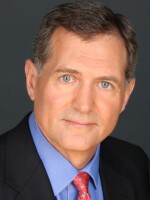MARY LOUISE KELLY, HOST:
Almost all of the Joint Chiefs, the nation's top military officials, are quarantining at home after a senior Coast Guard officer tested positive for COVID-19. Now, overall, the U.S. military has fared pretty well during the pandemic. This is the most serious coronavirus scare to date for the senior ranks of the military. And with more, I want to bring in NPR's Greg Myre.
Hey, Greg.
GREG MYRE, BYLINE: Hi, Mary Louise.
KELLY: So who is it? Who has tested positive? What do we know?
MYRE: It is the No. 2 officer in the Coast Guard, Adm. Charles Ray. He's tested positive, and he has some mild symptoms, according to the Pentagon. Now, we don't know for sure where he got it, but we do know he was at the White House at an event on Sept. 27, and that was just one day after Amy Coney Barrett was introduced as the nominee for the Supreme Court, an event that's been linked to many cases. Now, Ray himself is not a member of the Joint Chiefs, but he was at Pentagon meetings last week with others who are. And so those folks have been exposed.
KELLY: And do we know who all is quarantining? This goes all the way up to the chairman, Gen. Mark Milley.
MYRE: That's right. So it appears six of the seven members on the Joint Chiefs are quarantining, including Milley, also Paul Nakasone, the head of the National Security Agency. Now, they've all been tested, and there are no additional positive cases at this time. The military says they're doing this out of an abundance of caution, and there's no change in military readiness. Still, the symbolism here is very powerful. We have a president, the commander in chief, who has COVID, and now we have several of the top military officers in quarantine.
KELLY: Greg, as you know well, the military plans for everything - contingency plans abound. Had they planned for this?
MYRE: Well, they - in the general sense, yes, of course. The members of the Joint Chiefs have homes on military bases in the Washington area, most of them quite near the Pentagon. And so their homes do have secure communications, and they can easily stay in touch. And more broadly, all the national security leaders have setups like this at home, even if they are civilians. And just on Sunday, for example, there were several senior national security officials who gave President Trump a briefing when he was still at the Walter Reed National Military Medical Center. Now, it quickly gets complicated, though, as you move down the chain because many in the military or national security or intelligence can't really do much work from home because they can't take any classified material out of the office.
KELLY: Right. I mean, it strikes me that what we said about the - basically the military - other parts of the national security apparatus have stayed pretty healthy through this pandemic. It is amazing considering how tight the quarters can be on aircraft carriers and submarines and on bases.
MYRE: Yeah, that's absolutely true. The military, of course, has hundreds and hundreds of bases worldwide. And after the initial outbreak in China and as it spread through Asia, the military had to act very quickly. And their response in South Korea and Japan, where the U.S. has many thousands of troops stationed, were seen as very good models. Now, the military has reported eight deaths worldwide since the pandemic began. This is out of a force that's well over a million strong. The one exception, of course, was that big outbreak on the USS Theodore Roosevelt, that aircraft carrier where they had more than 1,200 cases.
KELLY: Right.
MYRE: But the general message they're trying to send is business as usual, national security officials otherwise going about their regular business.
KELLY: All righty (ph). Thank you, Greg.
MYRE: My pleasure.
KELLY: NPR's Greg Myre.
(SOUNDBITE OF MUSIC) Transcript provided by NPR, Copyright NPR.


